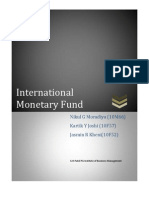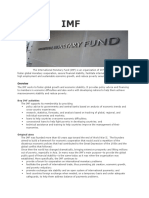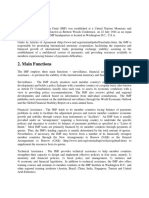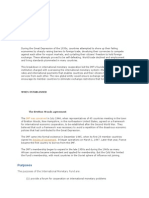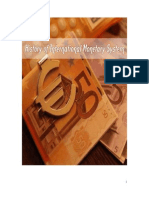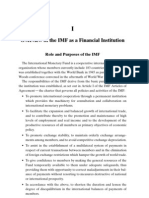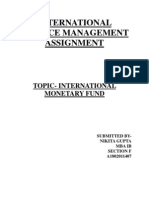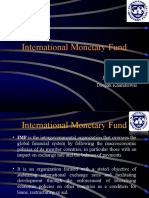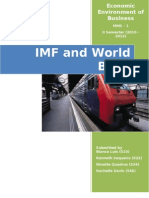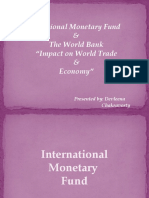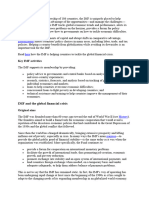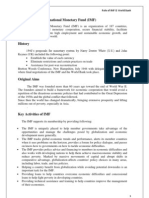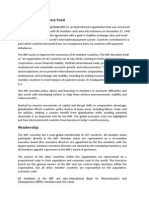International Financial and Economic Organizations (GEED 151) By: Mr. ANT VEYSEL (Group 1)
International Financial and Economic Organizations (GEED 151) By: Mr. ANT VEYSEL (Group 1)
Uploaded by
Anonymous GVWIlk3ZCopyright:
Available Formats
International Financial and Economic Organizations (GEED 151) By: Mr. ANT VEYSEL (Group 1)
International Financial and Economic Organizations (GEED 151) By: Mr. ANT VEYSEL (Group 1)
Uploaded by
Anonymous GVWIlk3ZOriginal Title
Copyright
Available Formats
Share this document
Did you find this document useful?
Is this content inappropriate?
Copyright:
Available Formats
International Financial and Economic Organizations (GEED 151) By: Mr. ANT VEYSEL (Group 1)
International Financial and Economic Organizations (GEED 151) By: Mr. ANT VEYSEL (Group 1)
Uploaded by
Anonymous GVWIlk3ZCopyright:
Available Formats
International Financial and Economic Organizations (GEED 151) by: Mr.
ANT VEYSEL (Group 1)
Department of Banking and Finance Eastern Mediterranean University
Asst.Prof.Dr. MUSTAFA BESIM (Group 2) Department of Banking and Finance - Eastern Mediterranean University Asst.Prof.Dr. SALIH KATIRCIOGLU (Group 3)
Department of Banking and Finance - Eastern Mediterranean University
THE INTERNATIONAL MONETARY FUND (IMF) Lecture 1
What Does the IMF Do? (Cont.)
The IMF is the world central organization for international monetary cooperation The IMFs primary purpose is to ensure the stability of the international monetary system (IMS). IMS is the system of exchange rates and international payments that enables countries (and their citizens) to buy goods and services from each other.
What does the IMF do? (Cont.)
The IMF provides technical assistance and training to help countries build the expertise and institutions they need for economic stability and growth. IMF
provides advice to its 184 member countries, encourages them to adopt policies that foster economic stability, reduce their vulnerability to economic and financial crises, raise living standards, and serves as a forum where they can discuss the national, regional, and global consequences of their policies.
What does the IMF do? (Cont.)
The IMF
also makes financing temporarily available to member countries to help them address balance of payments and/or foreign trade balance problems
History of the IMF
The IMF was established in July 1944 by 45 government representatives in Bretton Woods town, New Hempshire (USA). They agreed on a framework for international economic cooperation. It was believed that such a framework was necessary to avoid a repetition of disastrous economic policies that had contributed to the Great Depression of thee 1930s.
The IMF (Cont.)
The IMF has continued
to develop new initiatives to reform its policies and operations to help member countries meet new challenges to enable them to benefit from globalization and to manage and mitigate the risks associated with it.
How does the IMF serve its member countries?
The IMF performs three main activities:
I. Monitoring national, global, and regional economic and financial developments and advising member countries on their economic policies (surveillance). II. Lending members hard currencies to support policy programs designed to correct balance of payments problems. III. Offering technical assistance in its areas of expertise, as well as training for government and central bank officials.
IMF Main Business: Macroeconomic and Financial Sector Policies
The IMF focuses on the following:
I. Macroeconomic policies relating to the governments budget, the management of money and credit, and the exchange rate. Macroeconomic performance government and consumer spending, business investment, exports and imports, output (GDP), employment, and inflation.
II.
IMF Main Business: Macroeconomic and Financial Sector Policies (Cont.) III. Balance of payments - that is, the balance of a countrys transactions with the rest of the world. IV. Financial sector policies, including the regulation and supervision of banks and other financial institutions. V. Structural policies that affect macroeconomic performance such as those governing labor markets, the energy sector, and trade.
IMF Lending Facilities
Most of IMFs lending falls into three different categories:
Stand-By-Arrangements as designed to deal with short term balance of payments problems The IMF introduced the Extended Fund Facility to help countries address balance of payment difficulties related partly to structural problems that may take longer to correct than macroeconomic imbalance Under its Poverty Reduction and Growth Facility, the IMF provides concessional loans loans with an annual interest rate of 0.5 percent and a maturity of 10 years - to its poorest member countries.
IMF Lending Facilities (Cont.)
The IMF provides Emergency Assistance to countries coping with balance of payments problems caused by natural disasters or military conflicts. The interest rates are subsidized for low-income countries. The Trade Integration Mechanism allows the IMF to provide loans under one of its facilities to a developing country whose balance of payments suffers.
How Does the IMF help Poor Countries?
1. Most of the IMF's loans to low-income countries are made on concessional terms, under the Poverty Reduction and Growth Facility. 2. Under a mechanism introduced by the IMF in 2005the Policy Support Instrumentcountries can request that the IMF regularly and frequently review their economic programs to ensure that they are on track.
How Does the IMF help Poor Countries? (Cont.)
3. The success of a country's program is assessed against the goals set forth in the country's poverty reduction strategy, and the IMF's assessment can be made public if the country wishes. The IMF also participates in debt relief efforts for poor countries that are unable to reduce their debt to a sustainable level even after benefiting from aid, concessional loans, and the pursuit of sound policies. To ensure that developing countries reap full benefit from the loans and debt relief they receive, in 1999 the IMF and the World Bank introduced a process known as the Poverty Reduction Strategy Paper (PRSP) process.
4.
5.
Collaborating with Other Institutions
The IMF collaborates with
the World Bank, the regional development banks, the World Trade Organization, United Nations agencies, and other international bodies.
Each of these institutions has its own area of responsibility and specialization and its particular contribution to make to the world economy.
The IMF's collaboration with the World Bank on poverty reduction is especially close because the Bank is the leading international institution promoting economic development.
Collaborating with Other Institutions
(Cont.)
The IMF is also a member of the Financial Stability Forum (FSF).
FSF brings together government officials responsible for financial stability in the major international financial centers, international regulatory and supervisory bodies, committees of central bank experts, and international financial institutions.
Collaboration with the World Trade Organization takes place formally as well as informally. The IMF has observer status at WTO meetings and IMF staff contribute to the work of the WTO Working Group on Trade, Debt, and Finance.
UN Millennium Development Goals
In 2000, the international community agreed on a set of development targets known as the UN Millennium Development Goals,
These targets range from halving extreme poverty to halting the spread of HIV/AIDS and providing universal primary education, all by the target date of 2015.
They have been agreed by all countries and the leading development institutions. The financial assistance and advice the IMF offers to its poorest members are geared partly to helping them achieve the following goals:
UN Millennium Development Goals (Cont.)
Eradicate extreme poverty and hunger Achieve universal primary education Promote gender equality and empower women Reduce child mortality Improve maternal health Combat HIV/AIDS, malaria, and other diseases Ensure environmental sustainability Develop a global partnership for development
Who Runs the IMF?
The IMF is governed by, and is accountable to, its member countries through its Board of Governors. There is one Governor from each member country, typically the finance minister or central bank governor. The Governors usually meet once a year, in September or October, at the Annual Meetings of the IMF and the World Bank.
Who Runs the IMF? (Cont.)
Key policy issues related to the international monetary system are considered twice a year by a committee of Governors called the International Monetary and Financial Committee, or the IMFC. A joint committee of the Boards of Governors of the IMF and the World Bankthe Development Committee advises and reports to the Governors on development policy and other matters of concern to developing countries. The day-to-day work of the IMF is carried out by the Executive Board, which receives its powers from the Board of Governors, and the IMF's internationally recruited staff.
Who Runs the IMF? (Cont.)
Of the 24 Executive Directors on the Board, 8 are appointed by single countries
These 8 countries are
the IMF's 5 largest quota-holders: USA, Japan, Germany, France, and the UK and China, Russia, and Saudi Arabia.
The other 16 Executive Directors are elected for two-year terms by groups of countries known as "constituencies.
Unlike some international organizations (such as the United Nations General Assembly) that operate under a one-country-one-vote principle, the IMF has a weighted voting system. The larger a country's quota in the IMFdetermined broadly by its economic sizethe more votes the country has, in addition to its "basic votes," of which each member has an equal number.
Who Runs the IMF? (Cont.)
The Board rarely makes decisions based on formal voting; most decisions are based on consensus. In the early 2000s, in response to changes in the weight and role of countries in the world economy, the IMF began to reexamine the distribution of quotas and voting power to ensure that all members are fairly represented. IMF employees, who come from over 140 countries, are international civil servants. Their responsibility is to the IMF, not to the national authorities of the countries of which they are citizens.
Who Runs the IMF? (Cont.)
About one-half of the IMF's approximately 2,700 staff members are economists. Most of staff works at the IMF's Washington, D.C., headquarters, but the IMF also has over 85 resident representatives posted in member countries around the world. In addition, it maintains offices in Brussels, Paris, and Tokyo, which are responsible for liaison with other international and regional institutions and civil society organizations, as well as in New York and Geneva, which focus on liaison with institutions in the UN system. The Geneva office is also responsible for liaison with the World Trade Organization.
What is the SDR?
The SDR, or Special Drawing Rights, is an international reserve asset that member countries can add to their foreign currency and gold reserves and use for payments requiring foreign exchange. Its value is set daily using a basket of four major currencies: the euro, Japanese yen, pound sterling, and U.S. dollar. The IMF introduced the SDR in 1969 because of concern that the stock and prospective growth of international reserves might not be sufficient to support the expansion of world trade. (The main reserve assets at the time were gold and U.S. dollars.)
What is the SDR? (Cont.)
The SDR was introduced as a supplementary reserve asset, which the IMF could "allocate" periodically to members when the need arose, and cancel, as necessary. IMF member countries may use SDRs in transactions among themselves, with 16 "institutional" holders of SDRs, and with the IMF. The SDR is also the IMF's unit of account. A number of other international and regional organizations and international conventions use it as a unit of account, or as the basis for a unit of account.
Where Does the IMF gets its Money?
The IMF's resources come mainly from the quotas that countries deposit when they join the IMF. Quotas broadly reflect the size of each member's economy: the larger a country's economy in terms of output, and the larger and more variable its trade, the larger its quota tends to be. For example, the United States, the world's largest economy, has the largest quota in the IMF. Quotas are reviewed periodically and can be increased when deemed necessary by the Board of Governors.
Where Does the IMF gets its Money? (Cont.)
Countries deposit 25 percent of their quota subscriptions in Special Drawing Rights or major currencies, such as U.S. dollars or Japanese yen. Quotas, together with the equal number of basic votes each member has, determine countries' voting power. Quotas also help to determine the amount of financing countries can borrow from the IMF, and their share in SDR allocations. Most IMF loans are financed out of members' quotas.
Where Does the IMF gets its Money? (Cont.)
The exceptions are loans under the Poverty Reduction and Growth Facility, which are paid out of trust funds administered by the IMF and financed by contributions from the IMF itself and a broad spectrum of its member countries. If necessary, the IMF may borrow from a number of its financially strongest member countries to supplement the resources available from its quotas. Like other financial institutions, the IMF also earns income from the interest charges and fees levied on its loans. It uses this income to meet funding costs, pay for administrative expenses, and maintain precautionary balances.
The Purposes of IMF
The purposes of IMF are: i. To promote international monetary cooperation through a permanent institution which provides the machinery for consultation and collaboration on international monetary problems. To facilitate the expansion and balanced growth of international trade, and to contribute thereby to the promotion and maintenance of high levels of employment and real income and to the development of the productive resources of all members as primary objectives of economic policy. To promote exchange rate stability, to maintain orderly exchange rate arrangements among members, and to avoid competitive exchange rate depreciation.
ii.
iii.
The Purposes of IMF (Cont.)
iv. To assist in the establishment of a multilateral system of payments in respect of current transactions between members and in the elimination of foreign exchange restrictions which hamper the growth of world trade. To give confidence to members by making the general resources of the Fund temporarily available to them under adequate safeguards, thus providing them with opportunity to correct maladjustments in their balance of payments without resorting to measures destructive of national or international prosperity. In accordance with the above, to shorten the duration and lessen the degree of disequilibrium in the international balances of payments of members.
v.
vi.
For More Resources about IMF
The IMF posts a vast amount of information on its own activities and policies, as well as on its member countries, on its Web site, http:// www.imf.org . It also publishes Finance & Development, a quarterly magazine; a series of pamphlets called Economic Issues; a biweekly newsletter, the IMF Survey; the semiannual World Economic Outlook and Global Financial Stability Report; various statistical publications; and a wide array of working papers, occasional papers, and books. Some of these materials and the IMF's Annual Reports are available free of charge on the Web site; others can be ordered from IMF Publication Services (1-202-623-7430; publications@imf.org).
You might also like
- About The IMF2Document10 pagesAbout The IMF2Subhobrata MukherjeeNo ratings yet
- About The IMF: GlobalizationDocument56 pagesAbout The IMF: GlobalizationPranjal SrivastavaNo ratings yet
- Imf ProjectDocument7 pagesImf ProjectDeepali MestryNo ratings yet
- IMF of PakistanDocument5 pagesIMF of Pakistanwww.hussnainhkNo ratings yet
- International Monetary Fund: Nikul G Moradiya (10M66) Kartik Y Joshi (10F57) Jasmin R Kheni (10F52)Document37 pagesInternational Monetary Fund: Nikul G Moradiya (10M66) Kartik Y Joshi (10F57) Jasmin R Kheni (10F52)Jayesh Vasava100% (1)
- Key IMF ActivitiesDocument4 pagesKey IMF ActivitiesDwani SangviNo ratings yet
- BackgroundDocument14 pagesBackgroundsalehhunjraNo ratings yet
- Shruti IMF 2263Document19 pagesShruti IMF 2263Shruti ChahalNo ratings yet
- Sistem Kewangan Antarabangsa: Halaman 115-128 Bab 9Document14 pagesSistem Kewangan Antarabangsa: Halaman 115-128 Bab 9bennameerNo ratings yet
- Imf Presentation DataDocument13 pagesImf Presentation DataAli SyedNo ratings yet
- Bretton Woods InstitutionsDocument8 pagesBretton Woods InstitutionsPradyumn LandgeNo ratings yet
- Imf ProjectDocument17 pagesImf ProjectkitkomalNo ratings yet
- Overview of The IMFDocument18 pagesOverview of The IMFThakur99No ratings yet
- Globalization: Key IMF ActivitiesDocument3 pagesGlobalization: Key IMF ActivitiesJack DanialNo ratings yet
- International Finance Management Assignment: Topic-International Monetary FundDocument19 pagesInternational Finance Management Assignment: Topic-International Monetary Fundniks1190No ratings yet
- International Monetary Fund: Presented byDocument32 pagesInternational Monetary Fund: Presented bydeepakashwaniNo ratings yet
- The IMF (International Monetary Fund) and Its Implications in ArgentinaDocument8 pagesThe IMF (International Monetary Fund) and Its Implications in ArgentinaDora S DejeuNo ratings yet
- Role of IMF in International Monetary System - 2 - 2Document18 pagesRole of IMF in International Monetary System - 2 - 2Sushma VegesnaNo ratings yet
- The Multimedia Content On This Page Cannot Be Printed.Document14 pagesThe Multimedia Content On This Page Cannot Be Printed.tarak1401884898No ratings yet
- International Monetary FundDocument14 pagesInternational Monetary FundArsaha FatimaNo ratings yet
- Acknowledgement: Mrs. Rajam Rajagopalan For Her Exemplary Guidance, Monitoring and ConstantDocument41 pagesAcknowledgement: Mrs. Rajam Rajagopalan For Her Exemplary Guidance, Monitoring and ConstantVineeth MudaliyarNo ratings yet
- role of IMF (1)Document13 pagesrole of IMF (1)Surbhi SinghalNo ratings yet
- IMF and World BankDocument26 pagesIMF and World BankNinatte QuadrosNo ratings yet
- What We Do: Key IMF Activities Original Aims Adapting To ChangeDocument8 pagesWhat We Do: Key IMF Activities Original Aims Adapting To Changewaseem ahmadNo ratings yet
- Report:The International Monetary Fund (IMF) : Tatarlî Anastasia, 102RIDocument6 pagesReport:The International Monetary Fund (IMF) : Tatarlî Anastasia, 102RIAnastasia TatarlîNo ratings yet
- International Monetary Fund in Globalization: International Organization Bretton Woods ConferenceDocument43 pagesInternational Monetary Fund in Globalization: International Organization Bretton Woods ConferenceYogita BathijaNo ratings yet
- Assignment On Working of ImfDocument10 pagesAssignment On Working of ImfKartikay KharbandaNo ratings yet
- International Monetary Fund & The World Bank "Impact On World Trade & Economy"Document23 pagesInternational Monetary Fund & The World Bank "Impact On World Trade & Economy"Melodious HowlNo ratings yet
- Why The IMF Was Created and How It WorksDocument14 pagesWhy The IMF Was Created and How It Worksnaqash sonuNo ratings yet
- 1.1 About The International Monetary Fund: 1.2 Imf at A GlanceDocument33 pages1.1 About The International Monetary Fund: 1.2 Imf at A GlanceDeepali MestryNo ratings yet
- Contemporary - IMF and WBDocument11 pagesContemporary - IMF and WBShanlane CoronelNo ratings yet
- Amity Business School: MBA 2013, 3 SemesterDocument72 pagesAmity Business School: MBA 2013, 3 SemesterShwetika GuptaNo ratings yet
- Key IMF ActivitiesDocument10 pagesKey IMF Activitiesfalvi99No ratings yet
- Role of IMFDocument20 pagesRole of IMFSwati Sharma100% (1)
- IMF, World Bank and PakistanDocument29 pagesIMF, World Bank and Pakistansaad_sheikh_1100% (1)
- IMF by NIKHIL KANGODocument6 pagesIMF by NIKHIL KANGONikhil KangoNo ratings yet
- MODULE-4 INTERNATIONAL BUSINESSDocument74 pagesMODULE-4 INTERNATIONAL BUSINESSZoheb Ali KNo ratings yet
- IMFDocument4 pagesIMFRitwiz RishabhNo ratings yet
- Primary Purpose: What We DoDocument3 pagesPrimary Purpose: What We DoAngelo RoqueNo ratings yet
- SurveillanceDocument10 pagesSurveillanceBianca BiaNo ratings yet
- Contribution of IMF in Global TradeDocument48 pagesContribution of IMF in Global TradeNainaNo ratings yet
- Chapter 15 - Panugaling, Ramilyn AnnDocument43 pagesChapter 15 - Panugaling, Ramilyn AnnAmbray LynjoyNo ratings yet
- International Monetary FundDocument23 pagesInternational Monetary FundOussama MimoNo ratings yet
- 3 NassDocument3 pages3 NassshawnguroNo ratings yet
- International Monetary fund-5Document10 pagesInternational Monetary fund-5mayurikhale20No ratings yet
- International Financial InstitutionsDocument28 pagesInternational Financial InstitutionsMainak SenNo ratings yet
- Introduction To IMF-1Document53 pagesIntroduction To IMF-1Reida DelmasNo ratings yet
- Imf 190911Document4 pagesImf 190911Muhammad BilalNo ratings yet
- International Monetary FundDocument3 pagesInternational Monetary FundGary LLagunoNo ratings yet
- What Does International Monetary FundDocument4 pagesWhat Does International Monetary FundSanthosh T KarthickNo ratings yet
- International Monetary FundDocument6 pagesInternational Monetary FundHarsh PanchalNo ratings yet
- DocumentDocument3 pagesDocumentNirbhay SinghNo ratings yet
- Role of ImfDocument41 pagesRole of ImfAasthaNo ratings yet
- In the Wake of the Crisis: Leading Economists Reassess Economic PolicyFrom EverandIn the Wake of the Crisis: Leading Economists Reassess Economic PolicyRating: 5 out of 5 stars5/5 (1)
- International Finance Regulation: The Quest for Financial StabilityFrom EverandInternational Finance Regulation: The Quest for Financial StabilityNo ratings yet
- Reforming the International Financial System for DevelopmentFrom EverandReforming the International Financial System for DevelopmentNo ratings yet
- Finance in Africa: for green, smart and inclusive private sector developmentFrom EverandFinance in Africa: for green, smart and inclusive private sector developmentNo ratings yet
- Report of the Inter-agency Task Force on Financing for Development 2020: Financing for Sustainable Development ReportFrom EverandReport of the Inter-agency Task Force on Financing for Development 2020: Financing for Sustainable Development ReportNo ratings yet
- Public Finance: How to fix weak governance and obsolete systemsFrom EverandPublic Finance: How to fix weak governance and obsolete systemsNo ratings yet
- CRM 1Document71 pagesCRM 1Anonymous GVWIlk3ZNo ratings yet
- Case - MKTG - 4Document1 pageCase - MKTG - 4Anonymous GVWIlk3ZNo ratings yet
- Section 11 Case Studies of Episodes: What Is A Case Study? How To Conduct Case Studies ExamplesDocument26 pagesSection 11 Case Studies of Episodes: What Is A Case Study? How To Conduct Case Studies ExamplesAnonymous GVWIlk3ZNo ratings yet
- TechnologyDocument11 pagesTechnologyAnonymous GVWIlk3ZNo ratings yet
- Meunit 2planningDocument55 pagesMeunit 2planningAnonymous GVWIlk3ZNo ratings yet
- Services Marketing2821Document21 pagesServices Marketing2821Anonymous GVWIlk3ZNo ratings yet
- Economic Environment of BusinessDocument72 pagesEconomic Environment of BusinessAnonymous GVWIlk3ZNo ratings yet
- Amity Business SchoolDocument26 pagesAmity Business SchoolAnonymous GVWIlk3ZNo ratings yet
- WATER (Prevention and Control of Pollution) ACTDocument44 pagesWATER (Prevention and Control of Pollution) ACTAnonymous GVWIlk3ZNo ratings yet
- TYBMS Retail 2Document44 pagesTYBMS Retail 2Anonymous GVWIlk3ZNo ratings yet
- Raphael 06Document29 pagesRaphael 06lamiarohiNo ratings yet
- GNP Country CategoriesDocument2 pagesGNP Country CategoriesRáulyn MéndezNo ratings yet
- $Ffhvvwr6Dih:Dwhu: Charting The Progress of PopulationsDocument5 pages$Ffhvvwr6Dih:Dwhu: Charting The Progress of PopulationskatoNo ratings yet
- ECO344 International Economics ORIGINALDocument155 pagesECO344 International Economics ORIGINALThomas EmmanuelNo ratings yet
- Interest Rate Parity: by - Alpana Kaushal Deepak Verma Seshank Sarin Mba (Ib)Document14 pagesInterest Rate Parity: by - Alpana Kaushal Deepak Verma Seshank Sarin Mba (Ib)Deepak SharmaNo ratings yet
- Imf DM Export 20210930Document30 pagesImf DM Export 20210930Mayra GalvezNo ratings yet
- API SP - Pop.totl - Ma.in Ds2 en Excel v2 10226911Document71 pagesAPI SP - Pop.totl - Ma.in Ds2 en Excel v2 10226911mehedy09No ratings yet
- WTA Fact SheetDocument2 pagesWTA Fact SheetICC World Trade AgendaNo ratings yet
- Chapter 1Document10 pagesChapter 1dhaval_power123No ratings yet
- Driveware DBX 260Document3 pagesDriveware DBX 260Barr IsmaNo ratings yet
- Rutgers International Economics SyllabusDocument5 pagesRutgers International Economics SyllabusSally MistyNo ratings yet
- International EconomicsDocument3 pagesInternational EconomicsBunnyy LakhmaniNo ratings yet
- ISO Tolerances For Holes (ISO 286-2) : Over IncDocument1 pageISO Tolerances For Holes (ISO 286-2) : Over IncmarklaforestNo ratings yet
- API GBR DS2 en Excel v2Document618 pagesAPI GBR DS2 en Excel v2Raju SharmaNo ratings yet
- Feenstra Taylor Econ CH05Document65 pagesFeenstra Taylor Econ CH05Jenny Ko100% (1)
- Home Loan Details of Sbi (Bba 4th Sem.)Document9 pagesHome Loan Details of Sbi (Bba 4th Sem.)Kumar SaurabhNo ratings yet
- Tybcom Syllabus GoaDocument17 pagesTybcom Syllabus GoamasoodNo ratings yet
- IrwinDocument10 pagesIrwinOmar HayatNo ratings yet
- International Monetary Fund (IMF) & World Bank (IBRD)Document7 pagesInternational Monetary Fund (IMF) & World Bank (IBRD)Kaibalyaprasad MallickNo ratings yet
- LIBERAL THEORIES OF INTERNATIONAL RELATIONS: A PRIMER - Andrew MoravcsikDocument15 pagesLIBERAL THEORIES OF INTERNATIONAL RELATIONS: A PRIMER - Andrew MoravcsikHarryson Castro AponteNo ratings yet
- IMF and World BankDocument22 pagesIMF and World BankrlakshmanaNo ratings yet
- International Trade and Global Economic EnvironmentDocument2 pagesInternational Trade and Global Economic EnvironmentÅñkîtNo ratings yet
- API Ny - GDP.MKTP - CD Ds2 en Excel v2 422022Document73 pagesAPI Ny - GDP.MKTP - CD Ds2 en Excel v2 422022Navdurga RetailNo ratings yet
- Global Financial Governance Web PreviewDocument44 pagesGlobal Financial Governance Web Previewbiisbiss1712No ratings yet
- UNCTAD's Flagship Training Course For Policy Makers On An Integrated Perspective To Trade and DevelopmentDocument13 pagesUNCTAD's Flagship Training Course For Policy Makers On An Integrated Perspective To Trade and DevelopmentCharu ModiNo ratings yet
- Group 3 OUTLINE 2 (More Detailed For Article Analysis)Document12 pagesGroup 3 OUTLINE 2 (More Detailed For Article Analysis)2023127065No ratings yet
- Lesson 6Document5 pagesLesson 6triicciaa faithNo ratings yet
- Chapter 1: Introduction: To International EconomicsDocument77 pagesChapter 1: Introduction: To International EconomicsNgọcAnhNguyễnNo ratings yet
- International Economic Integration and Institutions: TopicDocument56 pagesInternational Economic Integration and Institutions: Topicrajat_singlaNo ratings yet
- Test Bank For International Economics 9th Edition by Krugman Chapter 3Document6 pagesTest Bank For International Economics 9th Edition by Krugman Chapter 3dxc12670100% (1)
- Hamsa Sandesh AmDocument19 pagesHamsa Sandesh AmNityaNiranjan PedroNo ratings yet




